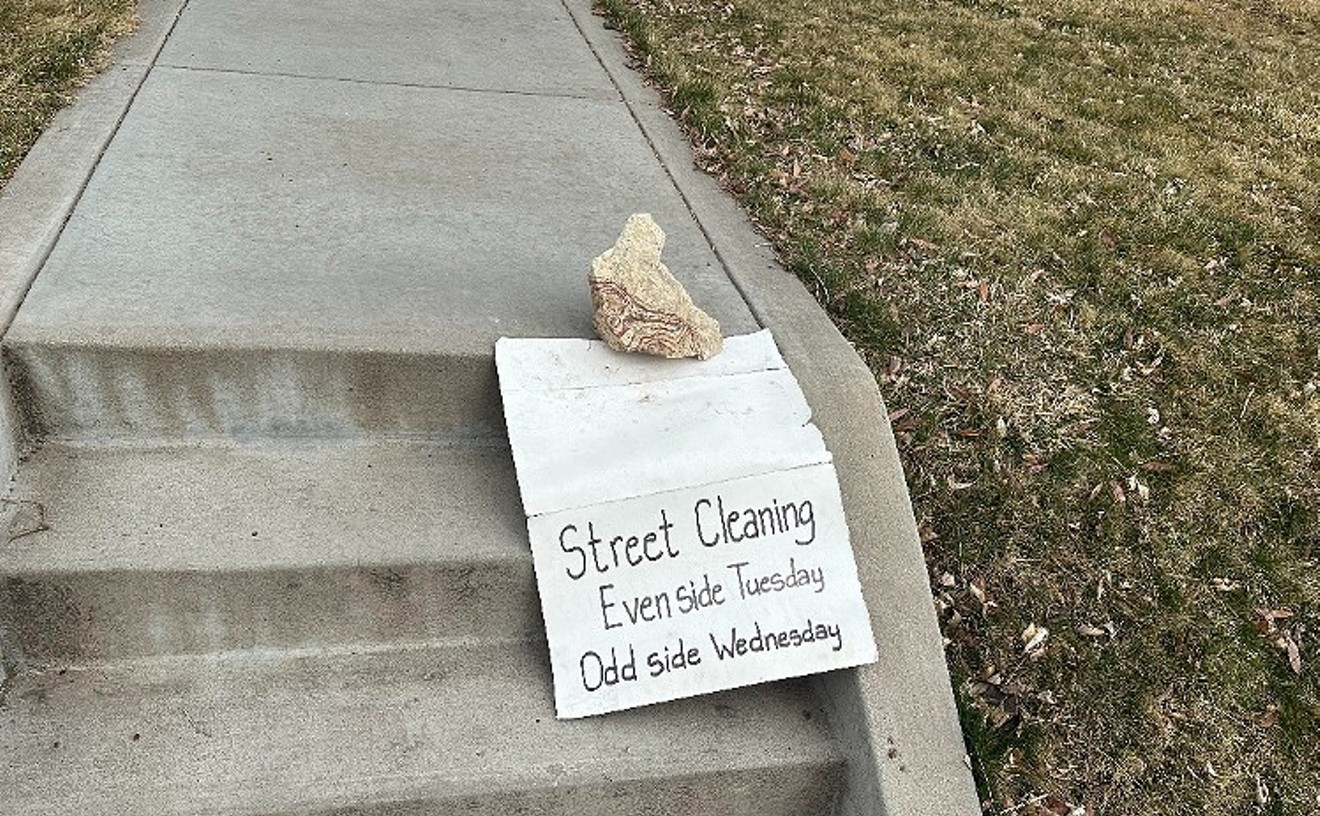Back in April, when the New Yorker published “The Voyeur’s Motel,” Gay Talese’s article detailing how Gerald Foos had spied on guests having sex in his East Colfax Avenue motel for decades through special ventilation screens he’d installed in the ceilings of the now-defunct Manor House motel, I was as amused, horrified and fascinated by the tale as were most people who read it.
Not everyone was pleased with Talese’s story, though, including some media critics who questioned his ethics, given that the legendary “new journalism” author had worked with Foos to keep the situation secret for decades.
I soon reached out to Foos by phone; I wanted to verify a claim that he’d been receiving death threats since the article’s publication. From the get-go, it was an unusual conversation, and it included the following unexpected exchange toward the middle:
“Wait...you been one of the guys that’s threatening me?” Foos asked abruptly.
“Sorry?”
“Your voice sounds familiar.”
"Uh, no. I’m a reporter with Westword, like I said..."
“Well, anybody can say, ‘I’m a reporter.’”
“No, I am not threatening you, sir.”
“Oh, okay. That’s fine.”
At the time, Foos told me he couldn’t talk about the motel because he was under contract and subject to a media embargo until Talese’s book, also titled The Voyeur’s Motel, was released in July.
Once the embargo was lifted, Foos said, he would field interview requests from only top national magazines and television talk shows. “Certain people with money in their pocket can talk to me,” Foos explained. “That’s the only people, and the way it’s gonna be. It’s gonna be costly.”
His stance didn’t seem too outlandish, considering that a production company owned by Steven Spielberg had just purchased the rights to turn the Foos story into a Hollywood film.
But then investigative reporters at the Washington Post revealed that Foos had actually sold the motel in 1980 and didn’t reacquire it until 1988, putting his credibility at serious risk. Talese even disavowed his own book — for one day — before reversing course and suggesting that Foos still had access to the motel’s attic during the eight-year stretch when he didn’t own the property.
It’s still not clear what actually happened, or when, between the author and his subject. But Colorado’s favorite sex “voyeur” has not shown up on any magazine covers or television shows — major or not — to discuss his “research,” as he puts it.
So I decided to reach out to Foos again, to see if he might give Westword an update.
As it turned out, I was not the first reporter to follow up with him after the Washington Post’s revelations. In fact, Foos said (with some pride and more than a hint of disappointment), Vanity Fair had flown one of its France-based reporters, Emily Barnett, from Paris to Denver just to talk to him. As soon as Barnett showed up on Foos’s doorstep, however, the publisher of Talese’s book, Grove/Atlantic, called Barnett’s editor to quash the interview. “I couldn’t believe that they wouldn’t allow that. It probably cost 5,000 bucks, at least, for her to come out here,” Foos said. “I wanted to talk to her.”
Since then, no one had contacted Foos for his story. And the 81-year-old, who occasionally refers to himself in the third person, told me he wanted to talk because “Gerald has all the knowledge.”
He then started spilling details about why he had not told the truth to Talese about selling the motel, as well as his thoughts about participating with the book to begin with. Right afterward, though, he asked me not to print those quotes, because he still believed himself to be under a media embargo. He suggested that I call the book’s publisher, Grove/Atlantic, to ask whether Westword could obtain permission to do an “exclusive.”
So I did, getting a noticeably alarmed and annoyed director of publicity named Deb Saeger on the phone. She admitted that there was nothing legally binding to keep Foos from talking to the press, but added that “we ask and prefer that you speak to the author [Talese].” Later, however, she said, “Mr. Talese has already done all of his press for this.”
I again reached out to Foos. But by the time I called to let him know what I’d learned — that there was nothing to prevent him from talking — Saeger, the Grove/Atlantic publicist, had already gotten to him. Foos said that he wanted to keep up a good business partnership with the publisher, especially with a movie potentially in the works, and so he would not go on the record about the motel.
I figured that was it and was ready to hang up when Foos said, “But you could do an article on my sports collection.”
And this is when things turned really bizarre, ending with Foos promising me hundreds of thousands of dollars and possession of one of his houses.
I remembered that Foos’s sports-memorabilia collection had been mentioned in the New Yorker article. Talese had written:
He wanted to show me his collection of sports memorabilia — tens of thousands of sports cards that Anita [his partner] had organized in alphabetical order. He explained that one of the reasons he was now willing to reveal himself as a voyeur was that he hoped the media notoriety might draw attention to his collection, which he was eager to sell. He believed it was worth millions.Talese had also mentioned that Foos had begun collecting cards and sports memorabilia at the age of ten, which would have been in roughly 1945.
“I’m really interested in selling it, and I’m having difficulty,” Foos told me. “The reason I’m having difficulty is because my agent is in jail.”
“That would make it hard,” I observed.
“Yeah, he went back to his drinking. And he just got his third DUI in Minnesota. That’s how he ended up in jail. And he may even go to prison. And if he does that, he’s finished as my agent,” Foos continued.
“Well, what does he value [the collection] at?” I asked.
“Twelve.”
“Twelve thousand?”
“No, God — it’s valued at about twelve million!”
Foos got more and more excited as he described what he claimed to be a collection of two million sports cards, all pre-1970, that apparently includes entire books of cards for individual players like Rickey Henderson, John Elway and Wayne Gretzky. But Foos’s greatest asset, he said, is a baseball that’s signed by the first thirteen Hall of Famers.
And while some of the items are stored at a bank, the rest are protected at his house by “Anita and my shotguns. We even have laser beams.”
In order to research the article, Foos referred me to a website address, historicsportscollection.net, that his agent had put together.
[Below: a YouTube video in which Foos describes his collection, also featuring Gay Talese. While the video is linked on historicsportscollection.net, it was not referred to in the New Yorker piece.]
Then, in another turn, he asked: “Well, actually, do you think you can sell it for me?
“There’s a big reward for anyone who sells this collection — and you’ve got an in. You know a lot about sports. That’s good. And I think you can do better writing about this sports collection than about that book. And if you sell this, I’m going to give you 5 percent. So let’s take a figure out. Say you sold it for six million, you get $300,000. And in addition to that, I would give you the house. I have a house that’s worth between $500,000 and $700,000. It’s not a mansion, just a nice, big two-story house. I’d give that to you because I don’t need it — and I don’t know what kind of family you have, sir.”
At this point, I was wondering what the hell was going on and why he thought I knew a lot about sports. (I don’t.) But I answered his question.
“I’m single.”
“Oh, you’re single right now? But you’re thinking, right? The house will be great for when you get married.”
“That’s really tempting,” I responded. “But I don’t know about all the business offers you made, because there are some ethical considerations as a journalist....”
“You don’t have a contract with Westword saying you can’t have outside interests, right?”
“It’s possible. I’d definitely have to consult with someone about this,” I said.
He encouraged me to do so, after which I could come over to his place to see the collection. “I can unload the shotguns,” he said. (He later explained that this was a joke.)
“Look, I can tell you lots of things. I know a lot about life. Probably more than anybody that there is. I hate to brag like that, but it’s the truth,” Foos said. “I’ve done the one that you know about — that’s pretty impressive. If you get my age and you don’t know anything, then your life has been a waste.”
I told him I’d need to think over the whole offer of becoming his agent.
“You’re going to get friends with Gerald, and that’s important,” the voyeur said before hanging up.











